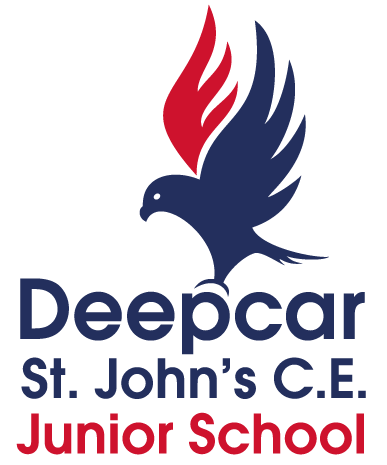RE
Intent
In line with our vision of children becoming their best versions, the aim of religious education at Deepcar St John’s is to engage, inspire and encourage pupils, equipping them with the knowledge and skills to know about and understand a range of religions and world views, which will express ideas and insights of their own into the significant human questions which religions address. RE will provoke challenging questions about meaning and purpose in life, beliefs about God, ultimate reality, issues of right and wrong and what it means to be human.
We aim to equip pupils with knowledge and understanding of a range of religions and world views, enabling them to develop their ideas, values and identity. It supports development of an aptitude for dialogue in pupils, so that they can participate positively in our society, which is diverse in relation to religions and world views. Pupils will learn how to study religions and world views systematically and gain and deploy the skills needed to interpret and evaluate evidence, texts and sources of wisdom or authority. They will learn to consider and articulate their personal beliefs, ideas, values and experiences while respecting the right of others to have different views, values and ways of life
RE will be delivered in school to meet the aims and objectives in the Sheffield Diocesan Agreed Syllabus by:
· Learning about to religious and non religious beliefs and worldviews, practices and ways of life.
· Developing knowledge and understanding of all members that make up our rich and diverse community.
· Developing knowledge and understanding of all members that make up our rich and diverse community.
· Undertaking visits to a variety of local places of worship and visits from those of faith communities.
· Developing knowledge and understanding of concepts and skills to make sense of religion and belief.
· Developing positive attitudes and values and to reflect and relate learning in RE to their own experience.
· Having the opportunity to learn that there are those who do not hold religious beliefs and have their own philosophical perspectives.
We are committed to providing children with an exciting and positive learning environment, in which they have the opportunity to develop their knowledge and understanding of religions while contributing to their spiritual, moral social and cultural development. The Christian elements of the RE curriculum are taught through the Understanding Christianity Programme
Implementation
At Deepcar St John’s we are part of the Diocese of Sheffield and follow the Sheffield Diocesan Agreed Syllabus. Parents can access our scheme of work which is based on this document on our website. We believe that Religious Education is unique in the school curriculum. It is a core subject for church schools and is seen as an underpinning and centrally important curriculum area. Religious Education at Deepcar St John’s promotes an enquiry-based approach through the implementation of the Diocesan Syllabus. The curriculum strands that relate to Christianity are delivered through the Understanding Christianity Programme. Pupils will be presented with a variety of learning opportunities including:
- handling artefacts
- exploring texts
- using imaginative play or drama to express feelings and ideas
- responding to images, games, stories, art, music and dance
- meeting visitors
- making visits to religious places of worship where possible, and where not, making use of videos and the internet
- taking part in whole school events (multi-faith days, Christian festival, school performances)
- participating in moments of quiet reflection
- participating in ‘Open the Book’ style assemblies
- using ICT to further explore religion and belief globally
- comparing religions and worldviews through discussion
- debating and communicating religious belief, worldviews and philosophical ideas and answering and asking ultimate questions posed by these
- Using First News and Picture News to learn about and understand current issues relating to religion and faith
Pupils are taught the knowledge, skills and understanding through deeper enquiry into known religions. Pupils in Year 5 and Year 6 consider the impact of beliefs and practices in greater detail and respond to more philosophical questions.
Impact
At Deepcar St John’s, we see the RE curriculum impacting the pupils in the following ways:
extending their knowledge and understanding of religions and beliefs
developing a religious vocabulary and interpret religious symbolism in a variety of forms
reflecting on questions of meaning, offering their own thoughtful and informed insights into religious and secular world-views
exploring ultimate questions of beliefs and values in relation to a range of contemporary issues in an ever-changing society
At the end of key stage two, pupils are expected to know, understand and apply knowledge and skills related to the learning themes embedded with the Diocesan Syllabus and the Understanding Christianity Programme. Assessment criteria have been developed in line with the expectations laid out in the Diocesan Syllabus, to enable teachers to assess the progress of the children as they move through school. Termly summative assessments are used to determine the children’s’ understanding and inform teacher’s planning and further differentiated support for pupils. This data is reviewed on a termly basis by the subject leader who also carries out learning walks, book scrutinies and lesson observations. The impact our RE curriculum is also sought directly from pupils as surveys and questionnaires to gather pupils’ voice on this subject and together with summative assessment.
Essential Learning Objectives
To understand beliefs and teachings
To understand practices and lifestyles
To understand how beliefs are conveyed
To reflect
To understand values
RE forms part of the National Curriculum that we have to teach in school but parents can withdraw their children for all or part of the lessons. Please contact Miss Jones, via the school office, to discuss this further.
Please visit our Curriculum Overview page for Subject Policies, Curriculum Booklets and Subject Information Leaflets.

